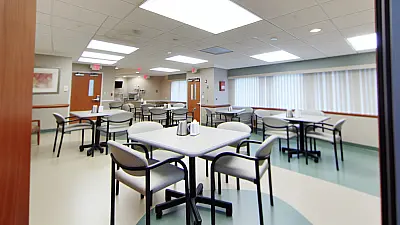LARIMORE, ND - Federal inspectors cited Good Samaritan Society - Larimore for operating without a properly trained infection control specialist, a violation that potentially exposed all residents, staff, and visitors to infectious disease risks during a February inspection.

Critical Staffing Gap in Infection Prevention
The facility's most significant violation involved the absence of an Infection Control Preventionist (ICP) with specialized training required by federal regulations. During the February 13, 2025 inspection, surveyors discovered that despite having a written policy requiring such expertise, the nursing home had no staff member meeting these qualifications.
The facility's own policy, updated in December 2024, explicitly stated that their infection preventionist "must have completed specialized training in infection prevention and control." However, when investigators interviewed an administrative nurse on February 10, the staff member confirmed the facility lacked anyone with this specialized training.
This staffing gap represents a fundamental breakdown in infection control infrastructure. Federal regulations mandate that nursing homes designate a qualified infection preventionist to oversee comprehensive infection prevention and control programs - a requirement that became even more critical following lessons learned during the COVID-19 pandemic.
Medical Significance of Infection Control Expertise
Infection control in nursing homes requires specialized knowledge that goes far beyond basic healthcare training. Proper infection prevention involves understanding complex protocols for outbreak investigation, surveillance systems, environmental cleaning standards, and isolation procedures specific to long-term care settings.
Without specialized training, facilities may miss early warning signs of infectious disease outbreaks, fail to implement appropriate containment measures, or inadequately protect vulnerable residents. Nursing home residents face heightened infection risks due to advanced age, compromised immune systems, and close living quarters that can facilitate rapid disease transmission.
The absence of qualified infection control oversight can lead to preventable infections including respiratory illnesses, gastrointestinal diseases, and antibiotic-resistant organisms. These infections can result in hospitalization, extended illness, and in severe cases, death among vulnerable elderly residents.
Industry Standards for Infection Prevention
Federal regulations require nursing homes to maintain robust infection prevention programs led by individuals with demonstrated expertise. This includes specialized training in epidemiology, microbiology, and facility-specific infection control protocols.
Qualified infection preventionists should possess certification from recognized organizations such as the Certification Board of Infection Control and Epidemiology, or have completed specialized coursework in infection prevention and control. They must understand surveillance methods, outbreak response procedures, and evidence-based prevention strategies.
The Centers for Medicare & Medicaid Services strengthened these requirements following the pandemic, recognizing that effective infection control requires dedicated expertise rather than assignment as an additional duty to existing staff members.
Regulatory Response and Facility Accountability
The violation received a "minimal harm or potential for actual harm" classification, affecting "many" residents according to the inspection report. While no specific infection outbreaks were documented during the survey period, the regulatory citation emphasizes the preventive nature of infection control requirements.
The facility's administrative nurse's acknowledgment that no qualified staff member existed demonstrates awareness of the compliance gap. This suggests the violation resulted from inadequate staffing decisions rather than misunderstanding of regulatory requirements.
Federal surveyors noted that the failure to employ properly trained infection control personnel placed all facility occupants at risk for acquiring infectious diseases. This broad impact assessment reflects the central role infection prevention plays in nursing home safety.
Healthcare Implications and Best Practices
Effective infection control programs require systematic approaches to prevention, detection, and response. Specialized training ensures staff can recognize infection patterns, implement appropriate isolation measures, and coordinate with public health authorities during outbreaks.
Modern infection control protocols involve complex decision-making about personal protective equipment, environmental cleaning standards, resident placement decisions, and staff cohorting during infectious disease events. These decisions require expertise that general nursing training may not provide.
The violation highlights the importance of investing in qualified personnel rather than treating infection control as a secondary responsibility. Facilities must ensure their infection preventionists possess current knowledge of evolving pathogens, resistance patterns, and evidence-based prevention strategies.
The inspection underscores ongoing challenges nursing homes face in maintaining specialized staffing while managing operational costs. However, the potential consequences of inadequate infection control - including preventable illness, regulatory penalties, and reputation damage - far exceed the investment in proper training and certification.
Full Inspection Report
The details above represent a summary of key findings. View the complete inspection report for Good Samaritan Society - Larimore from 2025-02-13 including all violations, facility responses, and corrective action plans.
💬 Join the Discussion
Comments are moderated. Please keep discussions respectful and relevant to nursing home care quality.